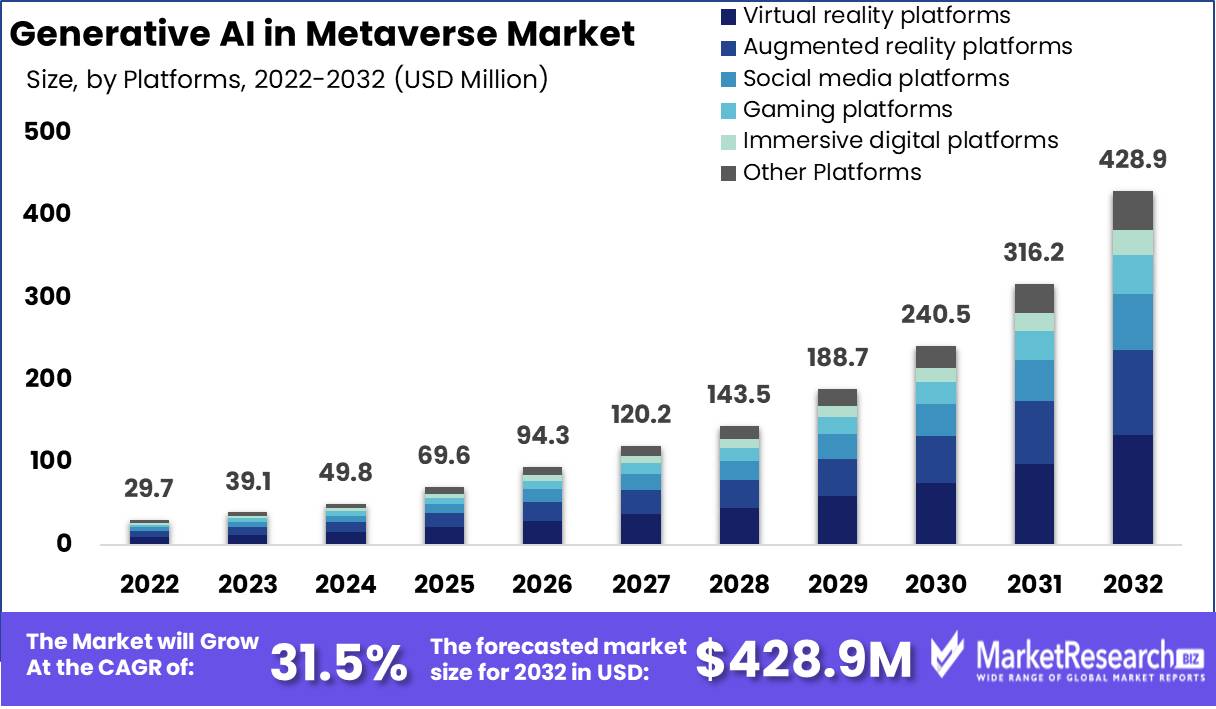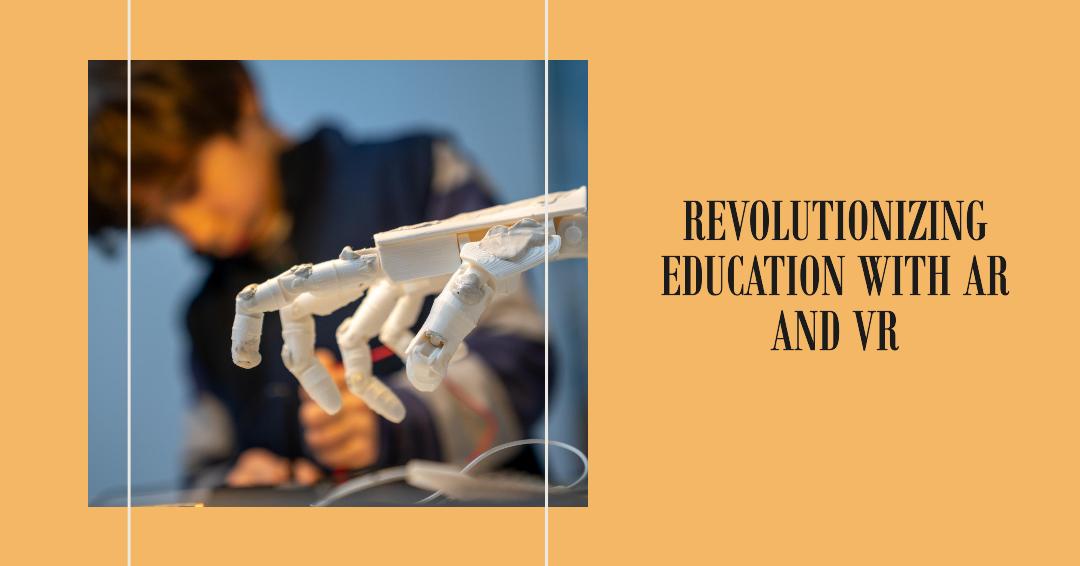Generative AI in Metaverse Market Will Forecasted to Boost USD 428.9 Mn, Expanding at a CAGR of 31.5% by 2032

Page Contents
Market Overview
Published Via 11Press : Generative AI in Metaverse Market size is expected to be worth around USD 428.9 Mn by 2032 from USD 29.7 Mn in 2022, growing at a CAGR of 31.5% during the forecast period from 2022 to 2032.
Recent years have witnessed remarkable advancements in the metaverse market, with generative AI playing an essential part in its rapid expansion and advancement. Generative AI refers to a technology that uses machine learning algorithms to generate unique and original content within virtual worlds like the metaverse – from images, videos and virtual worlds themselves.
One of the primary uses for generative AI in the metaverse is in creating realistic virtual environments. By taking advantage of generative AI algorithms, developers can generate detailed landscapes, buildings and objects that enhance user experiences – often unrecognizable from real life – creating visually striking and captivating virtual worlds.
Generational AI allows the creation of lifelike avatars within the metaverse, enabling users to customize their virtual identities by choosing from a wide selection of attributes like appearance, clothing and accessories. Generative AI algorithms create diverse avatars which add an element of individualism and personalization for all participants within this metaverse experience.
Another notable use of generative AI in the metaverse is its dynamic generation of content. This includes creating virtual characters, non-player characters (NPCs), and interactive objects within virtual worlds. Generative AI systems can generate diverse entities with realistic behaviors to provide rich user experiences within metaverse universe.
Generative AI plays an integral part in strengthening the social aspects of the metaverse. By harnessing its algorithms to enable natural language processing, generative AI enables virtual characters and NPCs to engage in meaningful dialogue with users – creating more immersive and realistic virtual world environments for social engagement and interaction.
Generative AI has also enabled user-generated content (UGC) creation within the metaverse, giving rise to UGC. Users can use tools available through generative AI to craft virtual assets ranging from clothing and accessories to entire virtual worlds – thus contributing to its ecosystem while creating an engaged community.
Request Sample Copy of Generative AI in Metaverse Market Report at: https://marketresearch.biz/report/generative-ai-in-metaverse-market/request-sample

Key Takeaways
- Generative AI is revolutionizing the metaverse market by creating immersive virtual environments that improve user experiences.
- AI algorithms produce realistic avatars to add personalization and individuality in the metaverse.
- Dynamic content generation powered by generative AI allows the creation of intelligent entities and interactive objects within a virtual reality setting.
- Social interactions within the metaverse are enhanced with generative AI's natural language processing abilities, facilitating meaningful conversations with virtual characters.
- User-generated content powered by generative AI empowers individuals to contribute meaningfully to the metaverse ecosystem and build an inclusive community.
- Generative AI algorithms play a pivotal role in creating immersive, visually stunning and captivating virtual environments that appear similar to reality.
- Generative AI's ability to generate realistic non-player characters (NPCs) for use in the metaverse is invaluable.
- Recent advances in generative AI within the metaverse market are shaping the future of digital interaction and virtual reality, providing immersive and engaging experiences.
Regional Snapshot
- North America remains a powerhouse in the generative AI in metaverse market, due to its advanced technological infrastructure and vibrant investment ecosystem, as well as a high concentration of leading metaverse platforms that facilitate the development and adoption of this emerging technology. Major tech hubs such as Silicon Valley as well as Seattle and Los Angeles serve as hubs of innovation that attract talented developers and entrepreneurs.
- Europe is witnessing remarkable development and adoption of generative AI within the metaverse market. Countries like United Kingdom, Germany and France boast flourishing metaverse ecosystems that include startups, research institutes and multinational corporations driving innovation. Furthermore, European markets focus on user engagement through interactivity and personalization using generative AI to deliver immersive experiences that resonate with users.
- Asia Pacific is fast emerging as a leading force in the market for generative AI-powered metaverse applications. Countries like China, Japan and South Korea have been at the forefront of technological innovations, particularly virtual reality (VR), augmented reality (AR) and mixed reality (MR). Their gaming and entertainment industries have helped make way for AI's incorporation into metaverse environments allowing the creation of visually stunning virtual worlds and highly engaging avatars.
- Latin America is witnessing an increase in interest for generative AI in metaverse markets, particularly Brazil and Mexico, which are seeing increased investments and startups related to this field. Driven by vibrant gaming communities and an increasingly digital population, generative AI is being employed to craft virtual experiences which reflect Latin America's rich cultural diversity.
- Middle East and Africa regions are witnessing steady, but encouraging, expansion in the market for generative AI in metaverse applications. Countries like United Arab Emirates, South Africa, and Nigeria are witnessing a marked increase in metaverse initiatives due to technological advancements, improved digital connectivity, and rising interest for immersive experiences.
For any inquiries, Speak to our expert at: https://marketresearch.biz/report/generative-ai-in-metaverse-market/#inquiry
Drivers
Technological Advancements have occurred
Rapid advances in generative AI technology, including increased algorithms and computing power, are fueling the expansion of the metaverse market for generative AI applications. These advances allow for the creation of more realistic virtual environments with lifelike avatars that generate dynamic content while improving user experiences within it.
Rising User Expectations
User interest for engaging and interactive virtual experiences is one of the key drivers behind generative AI's popularity in metaverse markets. Consumers want more tailored experiences; using generative AI allows creation of customized and unique virtual content, giving users more power over how their metaverse experiences unfold according to their preferences.
User-Generated Content Trend
User-Generated Content (UGC) in the metaverse represents a powerful driver for Generative AI tools. Users increasingly create virtual assets ranging from clothing and accessories to entire virtual worlds using these AI tools, inspiring creativity, collaboration and community engagement across its ecosystem.
Enhancements in natural language processing
Generative AI's ability to process and generate natural language plays an integral role in driving its market. Natural language processing algorithms facilitate more interactive conversations between virtual characters and NPCs, improving social interactions within the metaverse and creating a more immersive virtual environment.
Restraints
Ethical Considerations
Generative AI's application in the metaverse raises ethical considerations around privacy, data security and possible misuse. Achieve an acceptable balance between personalization and user privacy protection as well as consent management remains one of the greatest challenges when developing and deploying generative AI within this universe.
Technical Limitations
Generative AI has made remarkable advances, yet still faces technical limitations that limit its implementation across multiple environments and user interactions. Such challenges as creating indistinguishable virtual content from reality, real-time performance issues and large scale environments and user interactions create impediments to its full use and integration within the metaverse.
Cost and Infrastructure Requirements
Implementation of generative AI technology within the metaverse requires significant computing power, infrastructure and resources – requirements which may impose financial restrictions on smaller businesses or startups that limit their ability to leverage it as effectively as possible.
Intellectual Property and Copyright Issues
As AI becomes more prevalent, its presence raises concerns regarding intellectual property and copyright ownership. To protect creators' rights while guaranteeing fair use of AI assets in the metaverse. It is necessary to establish clear guidelines and regulations in order to establish fair usage policies of these artificially intelligent assets within the universe.
Opportunities
Expansion of Virtual Commerce
Generative AI offers virtual commerce within the metaverse. Marketplaces offering AI-generated products and services create opportunities for businesses to monetize their offerings while users engage in virtual transactions.
Increased Social Interactions (ASI)
Generative AI makes possible more realistic and interactive social interactions within the metaverse, providing opportunities for networking, virtual events, and collaborative experiences that create a sense of community among users.
Cross-Platform Integration
Integrating generative AI across different platforms, such as gaming consoles, VR headsets, mobile phones and social media sites provides users with seamless metaverse experiences across devices and platforms. This enables them to access generative AI-generated content across devices and platforms for maximum engagement.
Innovations in Virtual Education and Training
Generational AI in the metaverse can revolutionize virtual education and training experiences. AI-generated virtual environments and intelligent tutors provide immersive and personalized learning environments, providing unique opportunities for skill development, training simulations and educational experiences.
Take a look at the PDF sample of this report: https://marketresearch.biz/report/generative-ai-in-metaverse-market/request-sample
Challenges
Data Bias and Representation
Generative AI algorithms are vulnerable to bias when not trained with diverse and inclusive datasets, creating an ongoing challenge of accurately representing diverse user populations in the metaverse. To prevent perpetuating biases while accurately representing these user populations in future generative AI models.
User Adoption and Learning Curve
Adopting generative AI into the metaverse relies heavily on user acceptance and their understanding and navigation of AI-powered features and interactions. Minimizing learning curves while making this technology accessible for all users present developers and platform operators with significant challenges.
Legal Frameworks
As metaverse and AI technology continue to advance rapidly, regulatory and legal frameworks face unprecedented challenges in terms of regulation and legalities. Achieve proper oversight on issues related to intellectual property rights, data privacy concerns and AI governance require cooperation among stakeholders as well as creating comprehensive policies.
Trust and Security
Establishing trust in generative AI within the metaverse is of vital importance. Ensuring data security, protecting AI-generated content against misuse, and safeguarding against deepfake technology remain ongoing challenges that must be met to uphold user trust in the metaverse environment and maintain user confidence.
Market Segmentation
Based on Platforms
- Virtual reality platforms
- Augmented reality platforms
- Social media platforms
- Gaming platforms
- Immersive digital platforms
- Other Platforms
Based on Functionality
- Procedural content generation
- AI-driven character and object creation
- Natural language processing for virtual interactions
- Intelligent virtual assistants
- Personalized experiences
- Other Functionalities
Based on End-User
- Entertainment and gaming
- Education and training
- Healthcare
- Social media and communication
- Automotive
- Other End-Users
Key Players
- NVIDIA Corporation
- OpenAI
- Unity Technologies
- Epic Games
- Microsoft Corporation
- Facebook Reality Labs (Meta Platforms Inc.)
- Alphabet Inc. (Google)
- IBM Corporation
- Magic Leap
- Adobe Inc.
- Other Key Players
Report Scope
| Report Attribute | Details |
| Market size value in 2022 | USD 29.7 Mn |
| Revenue Forecast by 2032 | USD 428.9 Mn |
| Growth Rate | CAGR Of 31.5% |
| Regions Covered | North America, Europe, Asia Pacific, Latin America, and Middle East & Africa, and Rest of the World |
| Historical Years | 2017-2022 |
| Base Year | 2022 |
| Estimated Year | 2023 |
| Short-Term Projection Year | 2028 |
| Long-Term Projected Year | 2032 |
Request Customization Of The Report: https://marketresearch.biz/report/generative-ai-in-metaverse-market/#request-for-customization
Recent Developments
- In 2021, NVIDIA introduced GANverse3D, a groundbreaking GAN model capable of creating highly realistic 3D virtual environments, as a breakthrough development that allowed immersive metaverse experiences with unparalleled visual fidelity – further pushing the limits of generative AI technology.
- In 2021, Facebook (now Meta) unveiled Horizon Workrooms – a virtual reality (VR) workspace which leverages generative AI to generate avatars and simulate real-life interactions – to demonstrate its transformative potential for remote collaboration and work experiences within the metaverse. This development showcases its revolutionary nature.
- In 2021, OpenAI made significant advancements in generative AI with the implementation of DALL-E and CLIP models providing unique images from textual prompts created with DALL-E; CLIP provided cross-modal understanding between images and text.
- In 2022, Unity Technologies, a premier game development platform, announced their acquisition of Artomatix, a firm focused on AI-driven texture generation and content creation. This move strengthens Unity's generative AI capabilities while opening up opportunities to create realistic virtual environments and assets within the metaverse.
FAQ
1. What exactly is generative AI within the context of the metaverse?
A. Generative AI refers to the application of machine learning algorithms to generate original content within the metaverse. Generative AI creates realistic virtual environments, lifelike avatars and dynamic media – enhancing user experiences while providing personalized and interactive virtual interactions.
2. How does generative AI impact user experiences in the metaverse?
A. Generative AI enriches user experiences in the metaverse by creating stunning virtual environments, enabling customization of avatars, generating dynamic and interactive content, and supporting realistic social interactions. Generative AI adds depth, personalization, and engagement to virtual world environments – making the metaverse even more captivating and immersive for its users.
3. Can generative AI be utilized for user-generated content in the metaverse?
A. Yes, generative AI plays an essential part in user-generated content (UGC) within the metaverse. Users can leverage its tools to create their own virtual assets – clothing, accessories and entire virtual worlds! This enables users to contribute meaningfully to the metaverse ecosystem and fosters vibrant communities of diverse members.
4. Are there any difficulties associated with Generative AI in the metaverse?
A. There are challenges associated with data bias and representation, ensuring user privacy and data security, considering ethical considerations, creating regulatory frameworks, minimizing user learning curves and maintaining real-time performance for large environments with user interactions – these all pose obstacles for successful generative AI integration into the metaverse.
5. How does generative AI facilitate commerce within the metaverse?
A. Generative AI facilitates virtual commerce within the metaverse by offering customizable products and services that businesses can offer their customers. Generative AI gives businesses new avenues of revenue generation by providing unique virtual assets – like clothing, accessories and virtual real estate – which may open up opportunities for monetization within this ecosystem of transactions within virtual commerce.
6. Can Generative AI Be Used to Teach Metaverse Content?
A. Yes, generative AI holds immense promise to transform virtual education and training experiences in the metaverse. AI-generated virtual environments and tutors can create immersive and personalized learning environments that provide opportunities for skill development, simulation training, and educational experiences.
7. What are the future prospects of generative AI technology in the metaverse market?
A. Future prospects of generative AI in the metaverse market look bright. As technology progresses, we can expect more realistic and interactive virtual experiences, enhanced personalization and customization features, further advances in dynamic content generation capabilities and an expansion in opportunities for virtual commerce, education and social interactions within this metaverse environment.
Contact us
Contact Person: Mr. Lawrence John
Marketresearch.Biz
Tel: +1 (347) 796-4335
Send Email: [email protected]
Content has been published via 11press. for more details please contact at [email protected]
The team behind market.us, marketresearch.biz, market.biz and more. Our purpose is to keep our customers ahead of the game with regard to the markets. They may fluctuate up or down, but we will help you to stay ahead of the curve in these market fluctuations. Our consistent growth and ability to deliver in-depth analyses and market insight has engaged genuine market players. They have faith in us to offer the data and information they require to make balanced and decisive marketing decisions.



